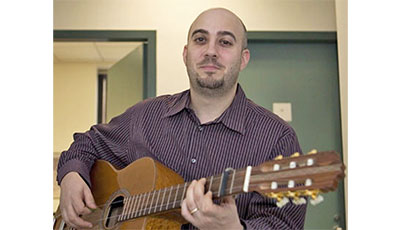
Ben Lapidus, chair of the Department of Art and Music and an associate professor of music at John Jay College, has been awarded the Latin Jazz USA Lifetime Achievement Award, joining the ranks of the great musicians “who have made outstanding contributions to Afro-Cuban jazz and Latin jazz.” Lapidus received the award on Friday, Nov. 18, at City College’s Aaron Davis Hall, where he played a concert alongside Latin Jazz legends Candido Camero and Bobby Sanabria, two of his musical heroes.
“There are a lot of other musicians who are very deserving of this award, so I am flattered and grateful,” Lapidus said. “I’m not the kind of person that takes a lot of time to look back on the stuff I’ve done, and I almost never listen to my own music. I tend to keep moving forward. So it’s cool for someone to say ‘Hey we enjoy what you do, let’s celebrate it.’”
Lapidus has been playing music since the age of six, and was 14 when he had his first paid gig. Born in Hershey, PA, he moved to the Upper West Side as a teenager, and was profoundly influenced by the local music culture. “There were a lot of great musicians in my neighborhood who were very influential,” he said, “a lot of Cuban, Puerto Rican and Dominican musicians who played in great bands and were very generous in giving me their time.” Lapidus also comes from a family with a long tradition of playing music, and said the seeds of his interest in Latin American and Caribbean music came from his father, a jazz pianist who, as a young man, drove from Brooklyn to Mexico, and then traveled to Cuba meeting relatives along the way.
Lapidus says the music that he performs, teaches, and writes about is distinctly New York in character, and as an academic he focuses much of his research on these interactions. “There’s a movement that’s been happening in New York for a long time where people from throughout the Caribbean and Latin America come and interact with the jazz musicians here, and that combination has led to a lot of developments not just in Latin jazz but in the pop music of the Caribbean. Different genres in different countries are greatly influenced by what happens here, so historically New York has been really important.”
“I’ve always worn two hats,” he said. “I really can’t just play or just teach. I think the two really inform and complement one another.” This view is reflected in Lapidus’s teaching style. He says he always gives an assignment in which students have to go out and see live music somewhere in the city, then write a paper about it. Although some of them might be initially less than excited about the assignment, they always come back to the classroom grateful for the experience.
To date Lapidus has given hundreds of performances in places like New York, Miami, Spain, Italy, and Cuba. He has played his signature instrument, the Cuban tres, on more than 50 recording sessions, including Buena Vista Social Club’s famous 1998 album, “Cuban Dreams: The New York Sessions.” He’s also recorded eight studio records under his own name, and is currently working on a 20th anniversary album for his band, Sonido Isleño.
“Everyone has an interesting story and how they’re linked together through music and history is really fascinating to me. The curiosity keeps me going,” he said.
Lapidus’ latest scholarly projects include a biography of Juanito Marquez, an 86-year-old Cuban musician who has been active in that country's music scene since the 1950’s, and another about Latin music in New York City, for which he received a grant from the National Endowment for the Humanities.
Click here for information on Lapidus’s award presentation and City College performance.



